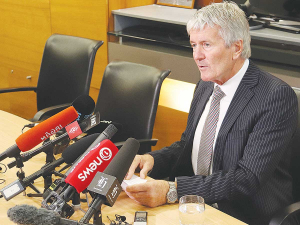NZ Catchment Groups Thrive with ‘Source to Sea’ Approach
The most successful catchment groups in NZ are those that have 'a source to sea' approach.
 Agriculture Minister Damien O'Connor says the outcome of the SOPI projections is a testament to the primary sector's efforts to keep the wheels turning.
Agriculture Minister Damien O'Connor says the outcome of the SOPI projections is a testament to the primary sector's efforts to keep the wheels turning.
NZ’s primary sector export revenue is projected to hit a record $50.8 billion in the year to June 2022, according to latest MPI projections.
MPI’s Situation and Outlook for Primary Industries (SOPI) forecasts the country’s annual food and fibre export revenue will crack the $50 billion mark for the first time next year – an increase of 6% over 2021’s earnings.
This revenue will be crucial in helping pay off the huge debts the country has incurred as a result of the Covid-19 pandemic, which has hit many parts of the NZ economy.
Agriculture Minister Damien O’Connor says the outcome of the SOPI revenue projections is a testament to the primary sector’s huge efforts to keep the wheels of our national and local economies turning. He says it’s important to acknowledge the hard work of rural New Zealand and to celebrate the performance and successes in the latest SOPI.
“High demand for our dairy products combined with strong export prices are expected to deliver an estimated 10 percent increase in dairy export revenue to $20.9 billion,” O’Connor says. “Meat export revenue is forecast to increase by 6% to $11.1 billion, driven by recovering export prices and demand for our meat products.”
Horticulture export revenue is also expected to increase as well.
“Consumers can’t get enough of our fresh fruit and wine with demand remaining strong. This is driving an expected increase in export revenue of 5% to $6.9 billion,” O’Connor adds.
Forestry exports are expected to reach $6.7 billion in the year to 30 June 2022, an increase of 3% on the current year.
Meanwhile, the country’s seafood exports are recovering from the challenges posed by COVID-19, such as the disruption to food service. Seafood export revenue is forecast to rise 4% to $1.9 billion in the year to 30 June 2022, as countries open up and food service resumes.
O’Connor believes new opportunities for New Zealand primary exports have potential to see even greater returns.
“Reaching the agreement in principle for the New Zealand – United Kingdom Free Trade Agreement in October will enable our exporters to compete on a level playing field in the UK market.”
He says the NZ primary sector was meeting strong demand as consumers around the world increasingly looked to healthier food and natural fibres with strong environmental credentials.
The Meat Industry Association of New Zealand (MIA) today announced that Chief Executive Officer Sirma Karapeeva has resigned from the role.
The winners of the 2026 Hawke’s Bay/Wairarapa Dairy Industry Awards were announced at the annual awards dinner held at Copthorne Solway Park in Masterton on Thursday evening.
Environment Southland is welcoming this week’s decision by the Environmental Protection Authority (EPA) to approve the release of Blaptea elguetai, a leaf‑feeding beetle that will help control the highly invasive Chilean flame creeper.
This March, the potato industry is proudly celebrating International Women’s Day on 8 March alongside the International Year of the Woman Farmer, recognising the vital role women play across every part of the sector — from paddocks and packhouses to research, leadership, and innovation.
Fruit trader Seeka posted a record profit and returns to shareholders in 2025.
Recent weather events in the Bay of Plenty, Gisborne/Tairawhiti, and Canterbury have been declared a medium-scale adverse event.

OPINION: A mate of yours truly reckons rural Manawatu families are the latest to suffer under what he calls the…
OPINION: If old Winston Peters thinks building trade relations with new nations, such as India, isn't a necessary investment in…